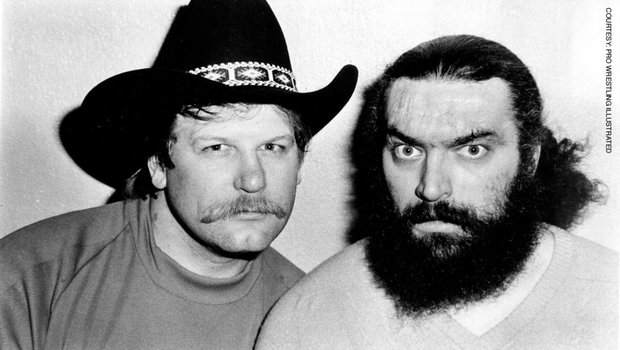Presented by Hannibal TV
Dirt sheet writer Bruce Mitchell, promoter Herb Simmons, WWF legend Tony Garea, Stan Hansen and Bruiser Brody’s widow Barbara Goodish are all on this panel designed to talk about Bruiser Brody.
Simmons speaks of booking Brody from the mid-70s onward. Simmons talks up how everyone on the panel knew Brody well and throws it to Barbara.
Goodish talks about meeting Brody while working at a hotel front desk. She was not a fan of wrestling. She saw Brody often enough that they became friendly, and finally one day she was invited to the bar to be with the boys. The wrestlers all starting leaving one by one until Brody was left alone with Barbara. Brody had set it all up so he could talk to her.
He liked Barbara so much that he gave her a large wad of cash and asked her to join him on an international wrestling tour.
Hansen first met Brody at West Texas State while Hansen was on campus as a football recruit. Brody was a junior at the time. Hansen was being given a tour by someone who happened to be Brody’s roommate. Brody’s side of the room was all tore up, while the other side was clean and tidy. Brody grunted a greeting and crawled back into the bed he had just crawled out from.
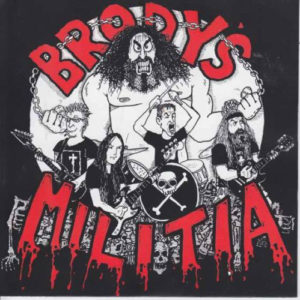
Mitchell puts over Brody for setting an example for everyone in the business in how to stand up to promoters and make sure you are fairly paid.
Simmons didn’t think Brody would agree to come work for his small Illinois shows, but Simmons and Brody got along and worked together for years. Nearby promoter Dick the Bruiser had tried to talk Simmons out of doing business with Brody because of his past issues with payoffs with the Bruiser. Those arguments led to a physical locker room fight that Dick the Bruiser lost.

Hansen talks about the structure of Japan in the early 80’s with Giant Baba and Inoki fighting for talent. Brody and Hansen were in opposite groups but Brody convinced Stan to jump to All-Japan so they could form an ass-kicking duo. Hansen credits their physical style with how the business evolved into the “strong style” we saw unfold.
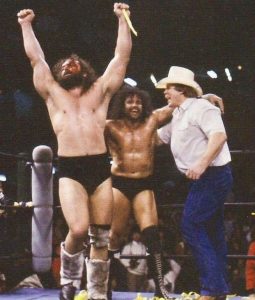
Barbara explains that Japanese promoters were always fair to Brody, so he saw them as his primary focus instead of joining with the WWF or JCP full time as wrestling went national in the mid-80’s. Brody recognized that he was getting older and would soon not be able to work at the elite needed level to survive in Japan, so he had figured on going to the WWF for a big money run with Hulk Hogan.
Brody had bought land which he had earmarked to build a camp for underprivileged kids. He also had started an anti-drug advocacy group where he would go to schools to talk to kids about the dangers involved with drugs.
Simmons had the honor to watch Lou Thesz and Brody work out for an hour in the ring before one of his shows. They were practicing for something they were planning for Japan.
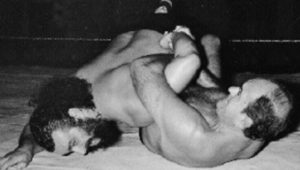
Mitchell explains how Brody would talk to the dirt sheets frequently because he realized that telling the truth could give the workers power over promoters.
Hansen explains how the Funk Brothers were not going to sit back and let Hansen and Brody roll them over, leading to some very physical, stiff encounters.

Brody was fair to you if you were fair to him. Herb Simmons tells of a time he tried to book Brody on a show that had already sold a bunch of tickets. Instead of taking the payday, Brody told him to hold off on bringing him in until they needed a name to draw with.
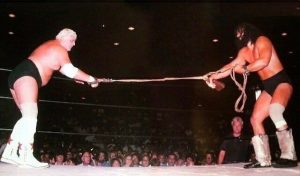
Whenever possible Brody would also help promote shows, even if it was in an off the wall manner. He posed for pictures pretending to toss a woman off a building, and another time put a jockey on his back and was photographed “racing” a horse.
World Class was in talks to work with St. Louis and bring in their hot Von Erichs/Freebirds feud to the town, but the WWF made the move to take over the city and stopped the cross promoting from going down.
Bob Roop stands up in the audience and speaks on being the first person to face Brody in a pro wrestling ring. Brody was comfortable right away, unlike so many rookies who are full of jitters.
Roop puts Brody over as a smart man who understood his brand as well as someone who respected the business.
Bruiser liked to work big men because they were less likely to whine about Brody’s physical style.
Brody’s son never saw him wrestle. He was only 7 when his father was murdered. When Brody wrestled near his home in Texas, Barbara would ride with Brody and their son, but they would go off and walk in nearby parks or beaches and not go to the wrestling show.
Brian Blair comes up and talks about his experiences working with Brody in Florida. Blair jokes about the amount of tuna fish Brody could eat at once. Brody was booked to go over Blair one night, but Brody called an audible and instead had the match end in a brawl throughout the arena, where he did a big blade job to help put Blair over.
Brody’s son Jeff took his dad to school for “show and tell”. At home Brody would get down and play with Jeff’s He-man toys with his son.
Final thoughts: This was an interesting group of people assembled to talk about Brody. Hansen and his widow were major pluses since they were so involved with him. Having a promoter from the era was a nice addition since Brody had so many issues over the years with his bosses. It gave the panel a unique perspective. Bruce Mitchell offered up a “fan’s” view since he watched the product before becoming a writer. Tony Garea added nothing as he openly admitted he only met Brody for a few days.

